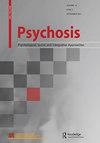From evidence to realities: psychosocial intervention provision in Australian routine community mental health practice
IF 1
4区 医学
Q4 PSYCHIATRY
Psychosis-Psychological Social and Integrative Approaches
Pub Date : 2022-02-04
DOI:10.1080/17522439.2021.2023615
引用次数: 0
Abstract
ABSTRACT Background This study explored care co-ordinator reports about provision of six evidence-based psychosocial interventions (PSIs) for people living with psychosis, to better understand decision-making about provision. Methods Conducted as an adjunct to the Second Australian National Survey of Psychosis in one catchment area, care co-ordinators completed a structured interview about evidence-based PSIs provided to 33 consumers as part of their community mental health care. Descriptive analyses were conducted. Results Care co-ordinators reported most consumers were provided at least one of the PSIs during the previous year; all were provided at least one non-evidence-based, typically briefer or simpler, alternative. Relapse Prevention Planning using early warning signs was reported as most provided; Family Psychoeducation was the least provided but rated as most helpful. The primary reason for non-provision of PSIs was that they had not been offered, with lack of relevance the most cited explanation. Conclusions PSIs may be more commonly provided than previously reported, if non-evidence-based alternatives are also considered: reasons for not offering evidence-based PSIs require further study. Meaningful guidelines are needed about when and how to offer PSIs in collaborative practice, including briefer or simpler interventions when preferred over more complex interventions.从证据到现实:澳大利亚常规社区精神卫生实践中的社会心理干预提供
摘要背景本研究探讨了护理协调员关于为精神病患者提供六种循证心理社会干预措施的报告,以更好地了解有关提供的决策。方法作为第二次澳大利亚全国精神病调查的一部分,在一个地区,护理协调员完成了一次关于向33名消费者提供循证精神病服务的结构化访谈,作为他们社区精神卫生护理的一部分。进行描述性分析。结果护理协调员报告称,在前一年,大多数消费者至少获得了一种PSIs;所有人都得到了至少一个非基于证据的、通常更简短或更简单的替代方案。据报告,使用早期预警标志的复发预防规划提供最多;家庭心理教育是提供最少的,但被评为最有帮助的。没有提供PSIs的主要原因是没有提供,引用最多的解释是缺乏相关性。结论如果也考虑非基于证据的替代方案,PSIs可能比以前报道的更常见:不提供基于证据的PSIs的原因需要进一步研究。关于何时以及如何在合作实践中提供PSIs,需要有意义的指导方针,包括更简短或更简单的干预措施,而不是更复杂的干预措施。
本文章由计算机程序翻译,如有差异,请以英文原文为准。
求助全文
约1分钟内获得全文
求助全文
来源期刊
CiteScore
2.20
自引率
8.30%
发文量
36

 求助内容:
求助内容: 应助结果提醒方式:
应助结果提醒方式:


